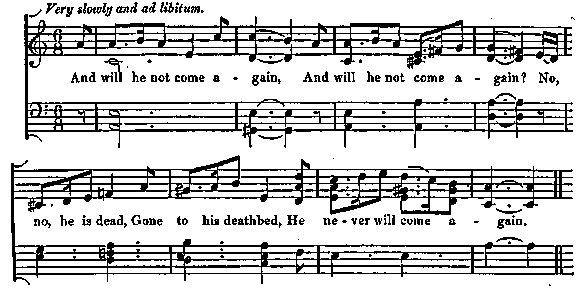Popular Music Of The Olden Time Vol 1
Ancient Songs, Ballads, & Dance Tunes, Sheet Music & Lyrics - online book
| Share page | Visit Us On FB |
|
|
||
|
ILLUSTRATING SHAKESPEARE. 237 |
||
|
|
||
|
A parody on this song seems to be intended in Rowley's A Match at Midnight, 1633, where the Welshman sings—
" Did hur not see hur true love-a
As hur'come from London?" &c. |
||
|
|
||
|
AND WILL HE NOT COME AGAIN ?
This fragment, sung by Ophelia, was also noted down by W. Linley. It
appears to be a portion of the tune entitled The Merry Milkmaids in The Dancing
Master, 1650, and The Milkmaids' Dumps in several ballads. The following lines
in Eastward Hoe, 1605, resemble, and are probably a parody on, Ophelia's song:—
" His head as white as milk,
All flaxen was his hair;
But now he is dead,
And lain in his hed,
And never will come again."—Dodsley, iy., 223. |
||
 |
||
|
|
||
|
His beard was white as snow, All flaxen was his hair,
He is gone, he is gone,
And we cast away moan ; God 'a mercy on his soul.
O DEATH! ROCK ME ASLEEP. In the second part of Shakespeare's King Henry IV., act ii., sc. 4, Pistol snatching up his sword, exclaims—
" What t shall we have incision ? shall we imbrue ? Then death rock me asleep, abridge my doleful days!" This is in allusion to the following song, which is supposed to have been written by Anne Boleyn. The words were printed by Sir John Hawkins in his History of Music, having been "communicated to him by a very judicious antiquary," then " lately deceased," whose opinion was that they were written either by, or in the person of, Anne Boleyn; "a conjecture," he adds, "which her unfortunate history renders very probable." On this Ritson remarks, " It is, however, but a conjecture: any other state prisoner of that period having an equal claim. |
||
|
|
||